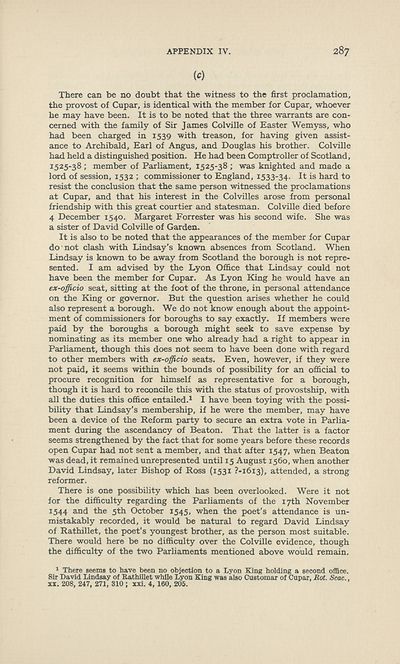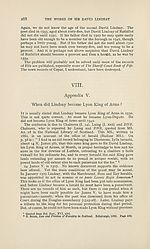Scottish Text Society publications > Third series > Works of Sir David Lindsay of the Mount, 1490-1555 > Volume 4, 1936
(355)
Download files
Complete book:
Individual page:
Thumbnail gallery: Grid view | List view

APPENDIX IV.
287
(C)
There can be no doubt that the witness to the first proclamation,
the provost of Cupar, is identical with the member for Cupar, whoever
he may have been. It is to be noted that the three warrants are con¬
cerned with the family of Sir James Colville of Easter Wemyss, who
had been charged in 1539 with treason, for having given assist¬
ance to Archibald, Earl of Angus, and Douglas his brother. Colville
had held a distinguished position. He had been Comptroller of Scotland,
1525-38 ; member of Parliament, 1525-38 ; was knighted and made a
lord of session, 1532 ; commissioner to England, 1533-34. It is hard to
resist the conclusion that the same person witnessed the proclamations
at Cupar, and that his interest in the Colvilles arose from personal
friendship with this great courtier and statesman. Colville died before
4 December 1540. Margaret Forrester was his second wife. She was
a sister of David Colville of Garden.
It is also to be noted that the appearances of the member for Cupar
do not clash with Lindsay’s known absences from Scotland. When
Lindsay is known to be away from Scotland the borough is not repre¬
sented. I am advised by the Lyon Office that Lindsay could not
have been the member for Cupar. As Lyon King he would have an
ex-officio seat, sitting at the foot of the throne, in personal attendance
on the King or governor. But the question arises whether he could
also represent a borough. We do not know enough about the appoint¬
ment of commissioners for boroughs to say exactly. If members were
paid by the boroughs a borough might seek to save expense by
nominating as its member one who already had a right to appear in
Parliament, though this does not seem to have been done with regard
to other members with ex-officio seats. Even, however, if they were
not paid, it seems within the bounds of possibility for an official to
procure recognition for himself as representative for a borough,
though it is hard to reconcile this with the status of provostship, with
all the duties this office entailed.1 I have been toying with the possi¬
bility that Lindsay’s membership, if he were the member, may have
been a device of the Reform party to secure an extra vote in Parlia¬
ment during the ascendancy of Beaton. That the latter is a factor
seems strengthened by the fact that for some years before these records
open Cupar had not sent a member, and that after 1547, when Beaton
was dead, it remained unrepresented until 15 August 1560, when another
David Lindsay, later Bishop of Ross (1531 ?-i6i3), attended, a strong
reformer.
There is one possibility which has been overlooked. Were it not
for the difficulty regarding the Parliaments of the 17th November
1544 and the 5th October 1545, when the poet’s attendance is un¬
mistakably recorded, it would be natural to regard David Lindsay
of Rathillet, the poet’s youngest brother, as the person most suitable.
There would here be no difficulty over the Colville evidence, though
the difficulty of the two Parliaments mentioned above would remain.
1 There seems to have been no objection to a Lyon King holding a second office.
Sir David Lindsay of Rathillet while Lyon King was also Customar of Cupar, Rot. Scac.,
XX. 208, 247, 271, 310; xxi. 4, 160, 205.
287
(C)
There can be no doubt that the witness to the first proclamation,
the provost of Cupar, is identical with the member for Cupar, whoever
he may have been. It is to be noted that the three warrants are con¬
cerned with the family of Sir James Colville of Easter Wemyss, who
had been charged in 1539 with treason, for having given assist¬
ance to Archibald, Earl of Angus, and Douglas his brother. Colville
had held a distinguished position. He had been Comptroller of Scotland,
1525-38 ; member of Parliament, 1525-38 ; was knighted and made a
lord of session, 1532 ; commissioner to England, 1533-34. It is hard to
resist the conclusion that the same person witnessed the proclamations
at Cupar, and that his interest in the Colvilles arose from personal
friendship with this great courtier and statesman. Colville died before
4 December 1540. Margaret Forrester was his second wife. She was
a sister of David Colville of Garden.
It is also to be noted that the appearances of the member for Cupar
do not clash with Lindsay’s known absences from Scotland. When
Lindsay is known to be away from Scotland the borough is not repre¬
sented. I am advised by the Lyon Office that Lindsay could not
have been the member for Cupar. As Lyon King he would have an
ex-officio seat, sitting at the foot of the throne, in personal attendance
on the King or governor. But the question arises whether he could
also represent a borough. We do not know enough about the appoint¬
ment of commissioners for boroughs to say exactly. If members were
paid by the boroughs a borough might seek to save expense by
nominating as its member one who already had a right to appear in
Parliament, though this does not seem to have been done with regard
to other members with ex-officio seats. Even, however, if they were
not paid, it seems within the bounds of possibility for an official to
procure recognition for himself as representative for a borough,
though it is hard to reconcile this with the status of provostship, with
all the duties this office entailed.1 I have been toying with the possi¬
bility that Lindsay’s membership, if he were the member, may have
been a device of the Reform party to secure an extra vote in Parlia¬
ment during the ascendancy of Beaton. That the latter is a factor
seems strengthened by the fact that for some years before these records
open Cupar had not sent a member, and that after 1547, when Beaton
was dead, it remained unrepresented until 15 August 1560, when another
David Lindsay, later Bishop of Ross (1531 ?-i6i3), attended, a strong
reformer.
There is one possibility which has been overlooked. Were it not
for the difficulty regarding the Parliaments of the 17th November
1544 and the 5th October 1545, when the poet’s attendance is un¬
mistakably recorded, it would be natural to regard David Lindsay
of Rathillet, the poet’s youngest brother, as the person most suitable.
There would here be no difficulty over the Colville evidence, though
the difficulty of the two Parliaments mentioned above would remain.
1 There seems to have been no objection to a Lyon King holding a second office.
Sir David Lindsay of Rathillet while Lyon King was also Customar of Cupar, Rot. Scac.,
XX. 208, 247, 271, 310; xxi. 4, 160, 205.
Set display mode to: Large image | Zoom image | Transcription
Images and transcriptions on this page, including medium image downloads, may be used under the Creative Commons Attribution 4.0 International Licence unless otherwise stated. ![]()
| Publications by Scottish clubs > Scottish Text Society publications > Third series > Works of Sir David Lindsay of the Mount, 1490-1555 > Volume 4, 1936 > (355) |
|---|
| Permanent URL | https://digital.nls.uk/107279135 |
|---|
| Shelfmark | SCS.STES3.8 |
|---|---|
| Attribution and copyright: |
|
| Description | A collection of over 100 Scottish texts dating from around 1400 to 1700. Most titles are in Scots, and include editions of poetry, drama, and prose by major Scottish writers such as John Barbour, William Dunbar, Gavin Douglas, and George Buchanan. Edited by a key scholarly publisher of Scotland's literary history, and published from the late 19th century onwards by the Scottish Text Society. Available here are STS series 1-3. |
|---|

